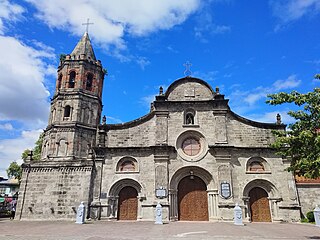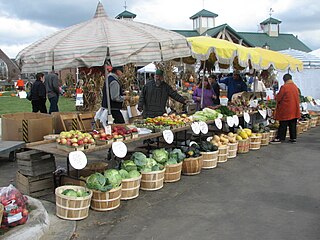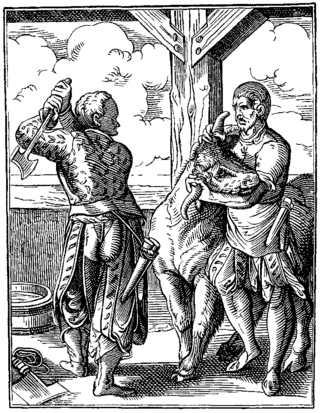Related Research Articles

Bulacan, officially the Province of Bulacan, is a province in the Philippines located in the Central Luzon region. Its capital is the city of Malolos. Bulacan was established on August 15, 1578, and part of the Metro Luzon Urban Beltway Super Region.

A farmers' market is a physical retail marketplace intended to sell foods directly by farmers to consumers. Farmers' markets may be indoors or outdoors and typically consist of booths, tables or stands where farmers sell their produce, live animals and plants, and sometimes prepared foods and beverages. Farmers' markets exist in many countries worldwide and reflect the local culture and economy. The size of the market may be just a few stalls or it may be as large as several city blocks. Due to their nature, they tend to be less rigidly regulated than retail produce shops.
Maria Gracia Cielo "Grace" Magno Padaca is a Filipino politician and former journalist who served as governor of Isabela from 2004 until 2010. She is also the recipient of the Ramon Magsaysay Award for Public Service in 2008.

Dog meat is the flesh and other edible parts derived from dogs. Historically human consumption of dog meat has been recorded in many parts of the world.
2000 in the Philippines details events of note that happened in the Philippines in the year 2000.
Horse slaughter is the practice of slaughtering horses to produce meat for consumption. Humans have long consumed horse meat; the oldest known cave art, the 30,000-year-old paintings in France's Chauvet Cave, depict horses with other wild animals hunted by humans. Equine domestication is believed to have begun to raise horses for human consumption. The practice has become controversial in some parts of the world due to several concerns: whether horses are managed humanely in industrial slaughter; whether horses not raised for consumption yield safe meat, and whether it is appropriate to consume what some view as a companion animal.

Animal slaughter is the killing of animals, usually referring to killing domestic livestock. It is estimated that each year, 80 billion land animals are slaughtered for food. Most animals are slaughtered for food; however, they may also be slaughtered for other reasons such as for harvesting of pelts, being diseased and unsuitable for consumption, or being surplus for maintaining a breeding stock. Slaughter typically involves some initial cutting, opening the major body cavities to remove the entrails and offal but usually leaving the carcass in one piece. Such dressing can be done by hunters in the field or in a slaughterhouse. Later, the carcass is usually butchered into smaller cuts.

Agriprocessors was the corporate identity of a slaughterhouse and meat-packaging factory based in Postville, Iowa, best known as a facility for the glatt kosher processing of cattle, as well as chicken, turkey, duck, and lamb. Agriprocessors' meat and poultry products were marketed under the brand Iowa Best Beef. Its kosher products were marketed under various labels, including Aaron’s Best, Shor Habor, Supreme Kosher, and Rubashkins.
In mid-2007, an outbreak of classical swine fever or hog cholera had affected the Central Luzon region of the Philippines, particularly in the provinces of Bulacan and Pampanga, as confirmed by the Department of Agriculture.

Puto is a Filipino steamed rice cake, traditionally made from slightly fermented rice dough (galapong). It is eaten as is or as an accompaniment to a number of savoury dishes. Puto is also an umbrella term for various kinds of indigenous steamed cakes, including those made without rice. It is a sub-type of kakanin.
The trial of Philippine president Joseph Estrada took place between 2001 and 2007 at the Sandiganbayan. Estrada, popularly called Erap, was resigned from office in 2001 during a popular uprising in Metro Manila after an aborted impeachment trial in which he was charged with plunder and perjury. Soon after his ouster, the same charges were filed against him at the Sandiganbayan.
Miss Philippines Earth 2009 was the 9th edition of the Miss Philippines Earth pageant. The grand coronation night was held on May 10, 2009, at Filoil EcoOil Centre, San Juan. Fifty contestants competed for the title. The event was broadcast by ABS-CBN in the Philippines and by The Filipino Channel internationally.

Elections were held in Central Luzon for seats in the House of Representatives of the Philippines on May 10, 2010.

Food safety incidents in China have received increased international media scrutiny following the reform and opening of the country, and its joining the World Trade Organization. Urban areas have become more aware of food safety as their incomes rise. Food safety agencies in China have overlapping duties. The 2008 Chinese milk scandal and COVID-19 pandemic received the most attention among food safety incidents.
Operation Sinaloa or Operation Culiacan - Navolato is an ongoing anti-drug trafficking operation in the Mexican state of Sinaloa by the Federal Police and the Mexican Armed Forces. Its main objective is to cripple all cartel organizations such as the Sinaloa Cartel, Beltrán-Leyva Cartel and Los Zetas that operate in that state. The Military was deployed in response to the murder of Mexico's Federal Police commissioner Édgar Eusebio Millán Gómez.

The Metro Rail Transit Line 7, also known as MRT Line 7 or MRT-7, is a rapid transit line under construction in the Philippines. When completed, the line will be 22.8 kilometers (14.2 mi) long, with 14 stations, and the first line to have a third rail electrification. The line runs in a northeast–southwest direction, beginning at San Jose del Monte, Bulacan up to the North Triangle Common Station in North Avenue, Quezon City.

Paelya or paella (Spanish) is a Philippine rice dish adapted from the Valencian paella. However, it differs significantly in its use of native glutinous rice (malagkít), giving it a soft and sticky texture, unlike the al dente texture favoured in Spanish paella. It is also characteristically topped with sliced eggs. Filipino paelya does not use saffron, but is instead coloured with atsuete (anatto), luyang diláw (turmeric), or kasubhâ (safflower).

Krus na Ligas is a barangay in Diliman, Quezon City in the Philippines. It is located within the premises of the University of the Philippines Diliman. It has a population of 21,287 based on the census conducted in 2020.

Waray-Waray gangs are generic terms used in the Philippines to denote of criminal groups who are of Waray ethnicity. They originated from provinces Leyte and Samar where the majority are of Waray background, later spreading into Luzon. Most of their criminal activities involved armed robberies, but various other gangs have also dabbled in kidnapping, carnapping, gun running, assassinations, gang warfare, and narcotics sale. Their bloody confrontations with the police made them the most notorious gang in the Philippines.
References
- ↑ Lopez, Allison (2007-12-13). "400 kilos of 'double-dead' meat seized from Divisoria". Inquirer.net. Archived from the original on 2008-01-26. Retrieved 2009-03-15.
- ↑ Lazaro, Ramon Efren R. (2007-08-07). "Bulacan holds lechon festival to show safety of pork meat". SME.com.ph. Archived from the original on 2008-02-24. Retrieved 2009-03-16.
- 1 2 "'Double Dead' Pork Seized in Balintawak" . Retrieved 2009-03-15.
- 1 2 Aurelio, JulieM. (2008-12-23). "1,000 kilos of double dead meat seized". Philippine Daily Inquirer. Archived from the original on 2009-02-17. Retrieved 2009-03-16.
- ↑ "Authorities charge man caught transporting double dead meat in Pasay". GMANews.tv. 2008-10-15. Archived from the original on 2009-03-03. Retrieved 2009-03-15.
- ↑ Ng, Jennifer A. (2008-11-19). "Govt to monitor markets, slaughterhouses to prevent sale of double-dead meat". Business Mirror. Retrieved 2009-03-16.
- 1 2 Aurelio, Julie M. (2008-12-09). "'Double-dead' meat seized in QC". Philippine Daily Inquirer. Archived from the original on 2008-12-12. Retrieved 2009-03-16.
- ↑ "QC to raise penalties for double- dead meat". Manila Times. 2007-08-14. Archived from the original on February 1, 2009. Retrieved 2009-03-16.
- ↑ Jaypee (2008-12-15). "QC officials step up drive vs 'hot meat'". Local Government of Quezon City. Archived from the original on 2019-12-17. Retrieved 2009-03-16.
- ↑ Padua, Reinir (2008-07-25). "Double-dead meat seized in QC". Philstar.com. Archived from the original on 2012-09-18. Retrieved 2009-03-15.
- ↑ "Bunye laughs off new impeachment complaint as 'double dead meat'". Official Website of the Republic of the Philippines. 2006-06-28. Archived from the original on 2016-03-03. Retrieved 2009-03-16.